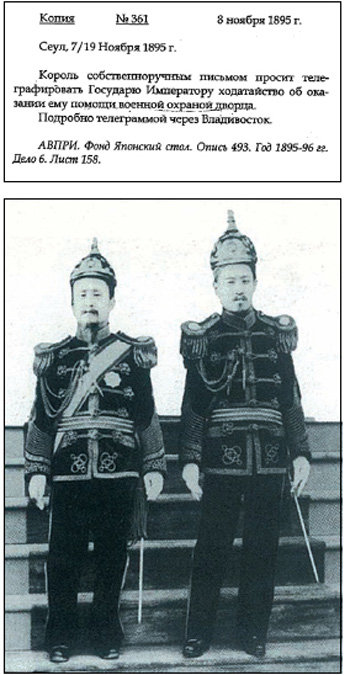King Gojong asked Russia to defend palace after Eulmisabyeon
King Gojong asked Russia to defend palace after Eulmisabyeon
Posted October. 29, 2015 08:47,

A Russian record has been identified for the first time that indicates that Emperor Kim Gojong of Korea, who feared threat for his own safety after Eulmisabyeon (Japans assassination of Empress Myeongseong) in 1895, requested Russia to provide security guards for his palace.
Kim Yeong-soo, a senior researcher at the Northeast Asian History Foundation, analyzed a report on Korea around the year 1898, which Karl Weber, Russias Minister Extraordinary and Plenipotentiary, sent to Russia in 1903, in his research paper entitled "Korea-Russia relations and Eulmisabyeon reflected in Russian Minister Extraordinary to Korea Webers report." Kim will present his paper at the national convention of historians, which will take place at Seoul National University on Saturday.
According to the report, Weber, who was then Russian envoy to Korea, sent a telegram to Russia on November 19, 1895, and informed that King Gojong requested Russia to deploy guards for the Korean royal palace. King Gojong sent his own handwritten letter requesting assistance to Weber.
Korea was in a grave jeopardy at the time, with King Gojongs own safety under threat, as it was soon after Japan assassinated Empress Myeongseong and formed a pro-Japanese cabinet. According to Researcher Kim, Weber threatened in person Japanese envoy to Korea Komura on October 25, 1895, when a meeting of diplomatic corps stationed in Korea took place, by saying that by accompanying 50 military soldiers, he would arrest defense minister Cho Hee-yeon and disarm the military training unit (that was backed by the Japanese military). From the Russian foreign ministry two days later on October 27, Weber received permission suggesting that the Russian government approved all measures aimed at protecting King Gojong from conspirators.
The last emperor of the Joseon Dynasty was in truly dire situation. Webers 1903 report noted that Japanese guards were monitoring the king (Gojong) like a prisoner at the palace as well, ahead of Agwanpacheon (Gojongs taking shelter at the Russian legation). King Gojong attempted to overcome fear over his own safety through Russias military assistance," Kim said on Gojongs request to deploy Russian guards at the palace. Russia did not deploy guards for the palace immediately, but it later resulted in Agwanpacheon in February 1896.
Webers report also includes records revealing Koreans public sentiment in early days after Agwanpacheon. The report reads In the morning of Agwanpacheon, rapid change occurred. Countless high-level officials and thousands of Koreans streamed into the area of the Russian legation. Jeongdong-gil where the Russian legation was located was full of cheering people, military, and police who came there to congratulate the monarch. It was a festival of people." Perplexed, Japan moved its troops stationed in Seoul to southern areas of the capital to defend Japanese people from angry mob. This record shows how strong anti-Japanese sentiment people had at the time, when Eulmiuibyeong, or soldiers that voluntarily mobilize in the cause of justice, took action to fight against Japan.
jjj@donga.com
Headline News
- Joint investigation headquarters asks Yoon to appear at the investigation office
- KDIC colonel: Cable ties and hoods to control NEC staff were prepared
- Results of real estate development diverged by accessibility to Gangnam
- New budget proposal reflecting Trump’s demand rejected
- Son Heung-min scores winning corner kick







